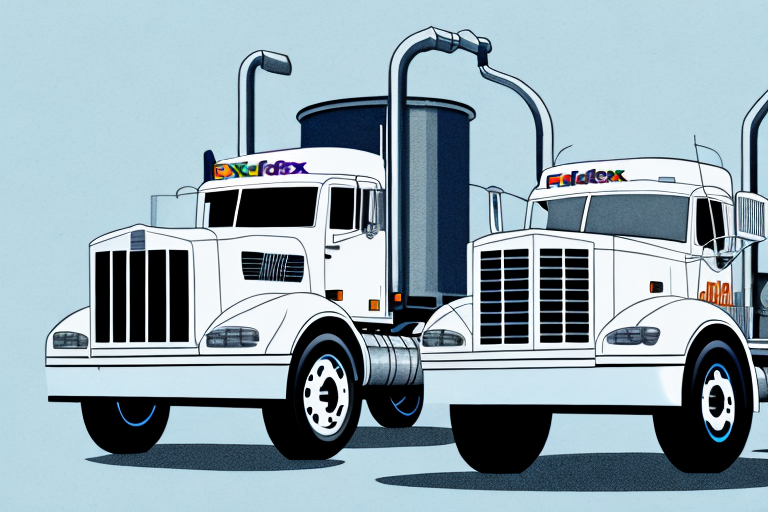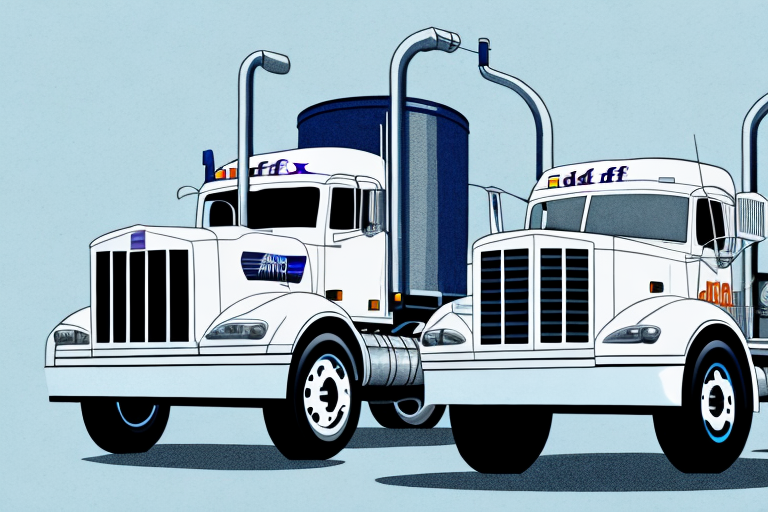Understanding the FedEx Express Fuel Surcharge
The FedEx Express Fuel Surcharge is a fee applied to shipments transported via the FedEx Express network. This surcharge reflects the fluctuating cost of fuel and other operational expenses that FedEx incurs while transporting packages. In this article, we'll delve into the intricacies of the FedEx Express Fuel Surcharge, exploring its calculation, impact, history, and strategies to mitigate its effects on your shipping operations.
What is the FedEx Express Fuel Surcharge?
The FedEx Express Fuel Surcharge is a variable fee added to the base transportation charges of a shipment. Expressed as a percentage, this surcharge fluctuates based on current fuel prices and other cost-influencing factors. The primary purpose of this surcharge is to help FedEx manage the volatility in fuel prices, ensuring that shipping rates remain relatively stable despite market fluctuations.
It's important to note that the FedEx Express Fuel Surcharge is a common practice among major carriers. Companies like UPS and DHL also implement similar surcharges. Shippers should account for these additional fees when planning their logistics budgets to avoid unexpected costs.
How is the FedEx Express Fuel Surcharge Calculated?
The calculation of the FedEx Express Fuel Surcharge is multifaceted, taking into account several key factors:
- Base Transportation Charges: The surcharge is a percentage of the shipment's base transportation cost.
- Fuel Prices: FedEx bases its surcharge on the weekly average price of jet fuel, as published by the U.S. Energy Information Administration (EIA).
- Distance: Longer shipping distances typically result in higher surcharge percentages due to increased fuel consumption.
- Shipment Type: Oversized or specially handled shipments may incur higher surcharges due to the additional fuel and resources required.
For example, as of [Insert Current Date], the average fuel surcharge for FedEx Express shipments is approximately 5.5% of the base transportation charge. This percentage adjusts weekly in response to changes in fuel prices.
Impact of Fuel Prices on the FedEx Express Fuel Surcharge
Fuel prices have a direct and significant impact on the FedEx Express Fuel Surcharge. When fuel prices rise, FedEx increases the surcharge to offset the higher operational costs. Conversely, when fuel prices decline, the surcharge decreases, providing some relief to shippers.
According to the U.S. Energy Information Administration, jet fuel prices can experience significant volatility, sometimes fluctuating by over 20% within a single year. This volatility necessitates a flexible surcharge system to maintain FedEx's financial stability while keeping shipping rates competitive.
Additionally, fluctuating fuel prices can influence the overall demand for shipping services. High fuel costs may discourage businesses and consumers from shipping frequently, whereas lower costs can lead to increased shipping activity.
Why Does FedEx Charge a Fuel Surcharge?
There are two primary reasons FedEx implements a Fuel Surcharge:
- Offsetting Operational Costs: Fuel is one of the largest expenses for transportation companies. By applying a fuel surcharge, FedEx can manage the unpredictable nature of fuel costs without continuously altering base shipping rates.
- Promoting Fuel Efficiency: The surcharge encourages shippers to choose more fuel-efficient shipping options. For instance, opting for ground shipping over air can result in lower surcharges, aligning with more sustainable business practices.
This dual approach not only stabilizes FedEx's financials but also promotes environmentally responsible shipping choices among customers.
The History of the FedEx Express Fuel Surcharge
The FedEx Express Fuel Surcharge was introduced in 2001 in response to rising fuel prices. At that time, the transportation industry faced increasing pressure to absorb higher fuel costs while remaining competitive. Implementing a fuel surcharge allowed FedEx to distribute some of these costs to customers without drastically increasing base shipping rates.
Over the years, the surcharge calculation method has evolved. In 2008, FedEx tied the surcharge percentage more closely to real-time fuel prices, allowing for more accurate adjustments. By 2015, the company shifted to using the weekly average price of jet fuel instead of a monthly average, enhancing the surcharge's responsiveness to market changes.
These changes have made the surcharge system more transparent and reflective of actual fuel expenses, benefiting both FedEx and its customers by fostering trust and predictability.
Minimizing the Impact of the FedEx Express Fuel Surcharge
For businesses seeking to reduce the financial impact of the FedEx Express Fuel Surcharge, several strategies can be employed:
1. Optimize Shipping Methods
Consider alternative shipping methods that may have lower surcharge percentages. Ground shipping, for instance, often incurs a lower fuel surcharge compared to air shipping. Assess your shipping needs to determine the most cost-effective method.
2. Consolidate Shipments
By consolidating multiple packages into a single shipment, businesses can reduce the overall number of packages, thereby decreasing total surcharge costs.
3. Negotiate with FedEx
Businesses with high shipping volumes may have leverage to negotiate lower surcharge rates with FedEx. Establishing a strong relationship with the carrier can open doors to more favorable pricing structures.
4. Utilize Third-Party Logistics Providers (3PLs)
3PLs can manage shipping logistics more efficiently and often secure better rates through bulk shipping agreements. They can also provide additional services like warehousing and inventory management, further optimizing your supply chain.
Alternatives to FedEx: Comparing Shipping Costs and Fuel Surcharges
Exploring alternative carriers can help businesses find more competitive shipping rates and favorable surcharge structures:
UPS (United Parcel Service)
UPS offers a similar fuel surcharge structure to FedEx but may have different percentages based on current market conditions. Additionally, UPS provides a wider range of shipping options, including comprehensive international services, which can be beneficial for businesses with global shipping needs.
DHL
DHL is a strong contender in the international shipping arena, offering competitive fuel surcharge rates and a broad network. Their focus on international logistics can provide advantages for businesses looking to expand globally.
Other Carriers
Companies like USPS and regional carriers may offer more tailored solutions with potentially lower surcharges. Evaluating multiple carriers allows businesses to choose the best fit for their specific shipping requirements.
Comparing FedEx Express Fuel Surcharge with Other Carrier Surcharges
When evaluating shipping options, it's crucial to understand how FedEx's Fuel Surcharge compares to those of other carriers:
- UPS: UPS adjusts its fuel surcharge based on the U.S. Secretary of Energy's forecasting, typically maintaining a similar approach to FedEx.
- DHL: DHL's surcharge model is aligned with international fuel prices, which may differ from domestic carriers.
- USPS: USPS has a more simplified surcharge structure, which can be advantageous for smaller businesses with less frequent shipping needs.
Each carrier's surcharge frequency and calculation method can vary, so it's essential to stay informed about these details to accurately predict and manage shipping costs.
Tips for Negotiating with FedEx on Fuel Surcharges
Negotiating Fuel Surcharge rates with FedEx can lead to significant cost savings for businesses. Here are some tips to effectively negotiate:
1. Demonstrate High Shipping Volumes
Businesses that ship large volumes have more negotiating power. Highlight your shipping frequency and volume to leverage better rates.
2. Consolidate Business with FedEx
Agreeing to handle all your shipping needs through FedEx can make you a more valuable customer, increasing your chances of securing lower surcharge rates.
3. Highlight Long-Term Partnerships
Emphasize the benefits of a long-term relationship, suggesting that reduced surcharges can lead to sustained business and mutual growth.
4. Be Prepared to Explore Alternatives
Showing that you are considering other carriers can provide leverage in negotiations. FedEx may be more willing to offer competitive rates to retain your business.
Conclusion
The FedEx Express Fuel Surcharge is a pivotal component of shipping costs for businesses relying on reliable delivery services. Understanding how this surcharge is calculated and its impact on your operations allows for more informed budgeting and strategic planning. By exploring alternative shipping methods, negotiating with carriers, and considering other logistical solutions, businesses can effectively manage and potentially reduce the financial burden of fuel surcharges.
Additionally, staying informed about fuel price trends and industry practices will enable businesses to anticipate changes and adapt accordingly. Implementing sustainable shipping practices not only helps in reducing costs but also contributes to environmental conservation efforts.




















